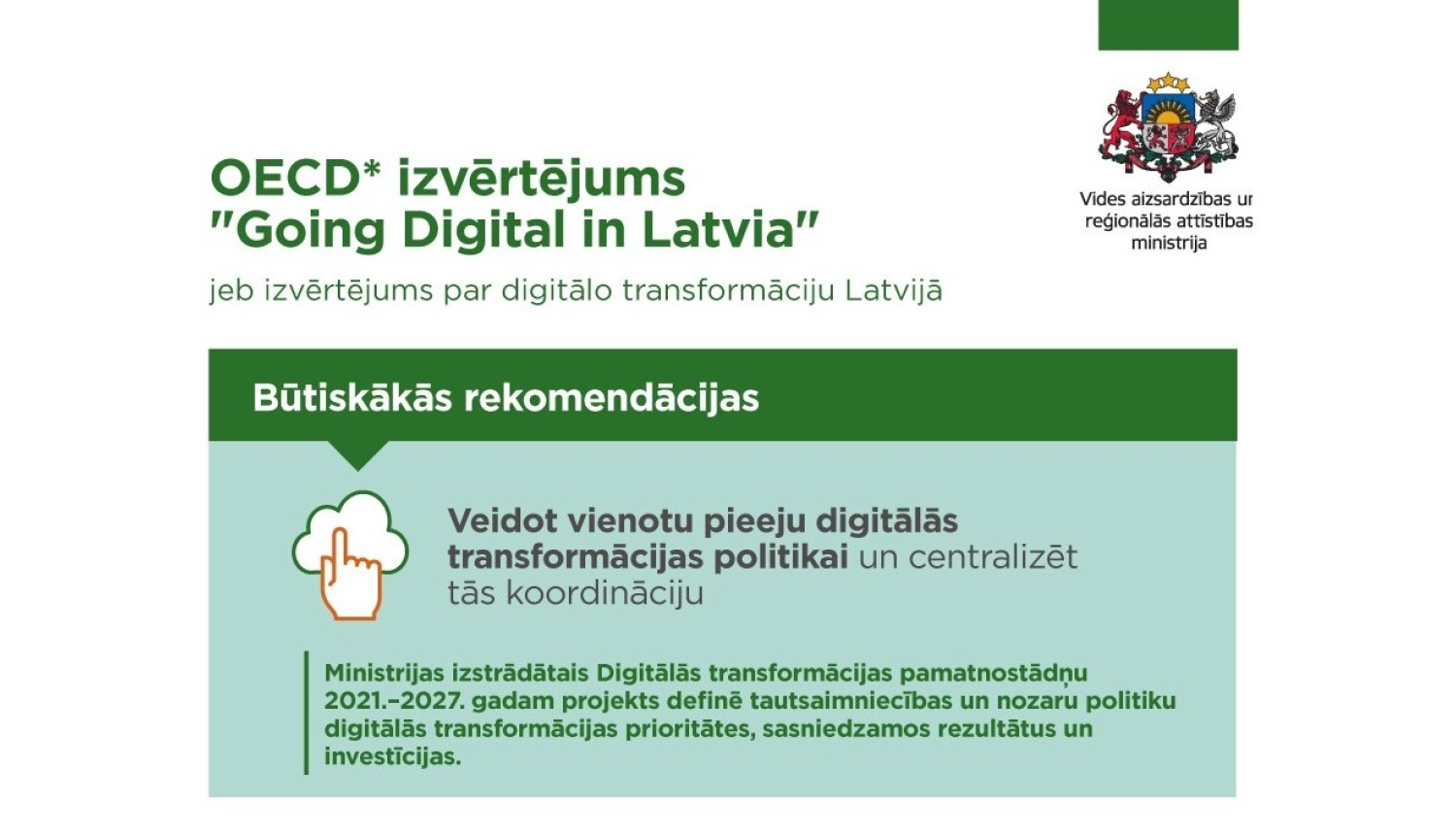Riga, February 10, 2021 - Environment Protection and Regional Development Minister Artūrs Toms Plešs reveals an online presentation of the “Going Digital in Latvia” evaluation by the Organisation for Economic Cooperation and Development (OECD). In this, the Director of the Science Technology and Innovation Directorate, Andy Wyckoff, presents the main conclusions and recommendations of the evaluation to improve the performance of Latvia's digital transformation policy.
At the initiative of the Latvian Government, the OECD has carried out an assessment with a view to analysing and making recommendations to policy makers in different sectors in order to respond to the challenges and opportunities arising from digital transformation by developing and introducing policy frameworks that promote a sustainable and inclusive digital economy and society.
Minister for Environmental Protection and Regional Development Artūrs Toms Plešs (AP!) stresses: “An evaluation of the digital transformation of the OECD Latvia has been carried out at a time when we define priorities and tasks in Latvia for the next programming period. . OECD recommendations make valuable recommendations for policy makers to increase digital governance, connectivity, digital technology deployment and use I. We can increase the performance of digital transformation if we continue to improve and improve digital skills and governance, increase the level of digital digitisation in businesses and boost confidence in the digital environment as a whole, and develop and apply innovation by creating a single government-wide approach to digital policy. . I am pleased that the conclusions of the OECD review are conceptually consistent with the objectives of the reforms that we have undertaken and the vision of information and communication technology priorities, particularly in the field of public services."
Latvia's assessment is special in that it is the first in which OECD experts carry out future forecasting or so. The development of the Foresight section, using a strategic perspective approach to explore alternative future scenarios that can arise as a result of the digital transformation of the global economy and society. It aims to help policy planners better anticipate major changes, identify uncertainties and encourage the development of innovative strategies and policies.
The recommendations made by the OECD in the field of digital governance call for the promotion of digital transformation policy as a priority on the policy agenda, with a single government-wide approach, and for the establishment and establishment of institutional mechanisms to coordinate digital transformation policies at government level. For the implementation of the OECD's digital management recommendations, the Ministry of Environmental Protection and Regional Development (MAY) intends to implement three major reforms, including the reform of the country's ICT governance, the reform of information and data management, and also the reform of service management.
In order to improve connectivity, the OECD recommends involving local stakeholders in the rural broadband programme, which covers the connection of the last mile or service provider (operator) communications sites with the end user, and promoting the demand through targeted initiatives that the Ministry of Transport (MOU) intends to implement with the State aid programme for 2021-2027. Accessibility and quality of communication is one of the corners of the Digital Economy and Society. For the period 2021-2027 of the Digital Transformation Guidelines, WE can already participate as co-responsible in the development of centralised IPv6 and IPv4 address management and use policies in public administration this year.
In order to increase the uptake and use of digital technologies, OECD experts have pointed to the need to improve digital skills and to increase the use of digital technologies in companies. Measures are intended for this In the planning documents of The Ministry of Education and Science, the Ministry of Economics and other ministries, including local governments, educational institutions, businesses, social partners and non-governmental organisations.
In order to increase confidence in the digital environment, the OECD assessment calls for improved coherence between the planning documents for digital policy and cyber security, consumer awareness on e-commerce issues. These recommendations should be addressed in the context of cyber security strategies and consumer protection policies. The security of the digital environment is one of the components of the Digital Transformation Guidelines for 2021-2027. May already plans to make legislative changes this year by targeting more widespread adoption of national and qualified electronic identification tools in digital services.
For the use of digital innovation opportunities, the evaluation recommends focusing funding on selected niches of excellence as well as research areas that complement other areas of smart specialisation and relate to the scope of the Smart Specialisation Strategy.
The Going Digital in Latvia evaluation is presented in Latvia. on February 10, with the participation of the Minister for Environmental Protection and Regional Development, Artūrs Toms Plešis, Latvian ambassador to OECD Indulis Abelim, Director of the OECD Science Technology and Innovation Directorate, Mr Edwin Balševicam, STATE Secretary, as well as representatives from the Ministry of Defence, Ministry of Economy, Ministry of Education and Science, Ministry of Welfare, Ministry of Welfare, Ministries of Transport, Ministry of Justice and Ministries of Agriculture.
The evaluation is available here: https://www.oecd.org/latvia/digitalizacija-latvey-a 58 d 1 c 1a-lv.htm
Infographic: “OECD Assessment of Going Digital in Latvia” or assessment of digital transformation in Latvia”
* IPv4 – Internet Protocol (IP) version 4, which is based on technology, allows us to connect our devices to the web.
IPv6 - Next Generation Internet Protocol address standard aimed at supplementing and replacing IPv4.
Information prepared by:
Public Relations Department
Ministry for Environmental Protection and Regional Development
20200305; 67026533,
e-mail: prese@varam.gov.lv
www.varam.gov.lv
